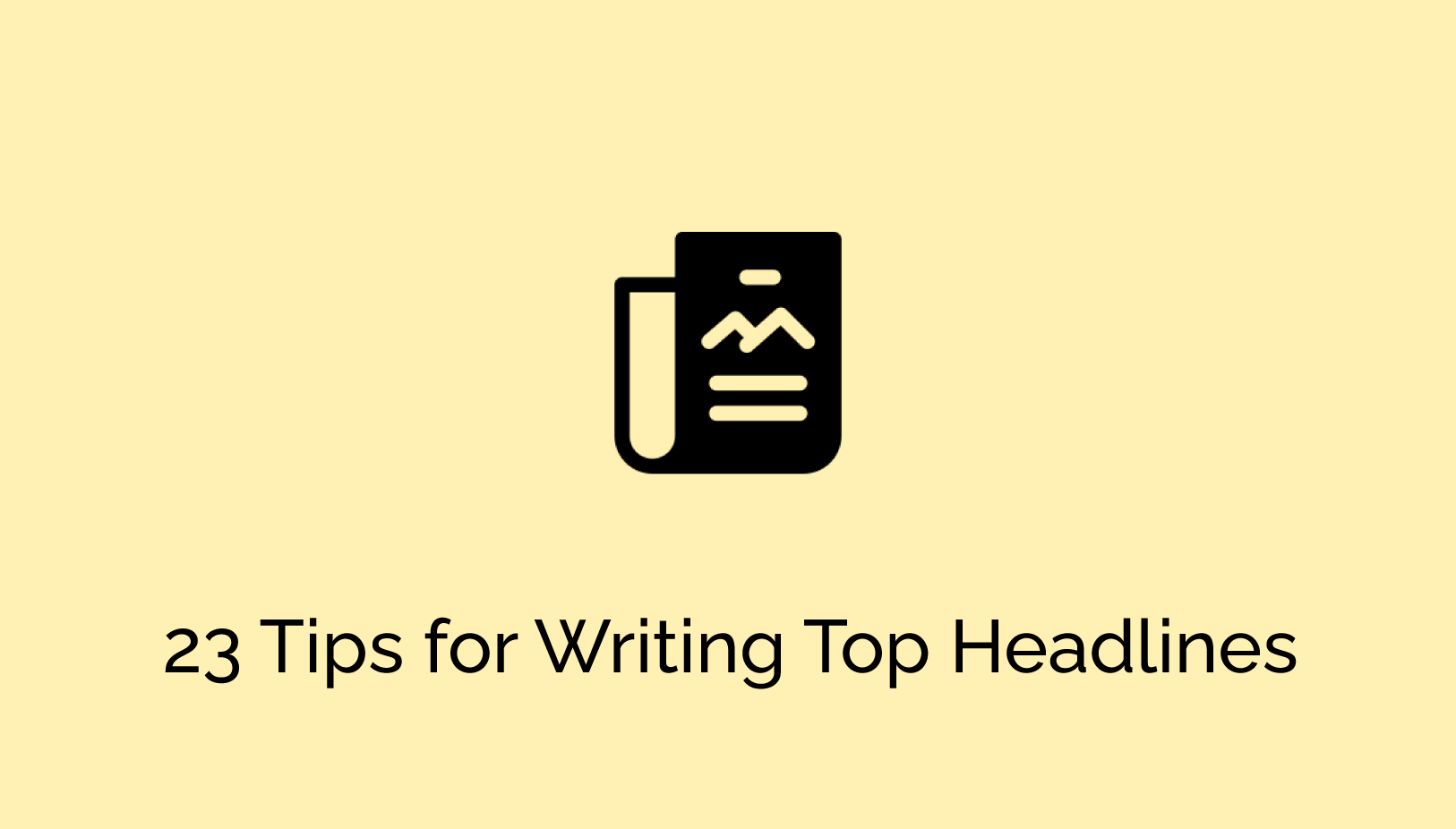The importance of writing headlines should not be underestimated. Creating a headline that makes an immediate impression on a reader often defines whether or not they read on. There is no standard formula to writing a good headline but there are a number of options that you should consider including for maximum impact in headline writing. Here are 23 Tips for Writing Top Headlines that encourage further reading:-
01. Use Numbers
Numbers in numerical form (not written as words) in headlines are appealing to readers. Using more than one set of numbers in a headline is also historically effective.
02. Ask a Question
Ask a question in your headline in order to pique a visitor’s natural curiosity to find out the answer.
03. Create a Connection
Refer to your audience as “you” to create a subliminal connection, with more readers likely to investigate your article further. Include yourself as part of the collective by using “we” or “us” to strengthen this connection even further.
04. Use Emotional Words and Positive Adjectives
Remember that you want to appeal to your audience’s emotions. Use empathy and suggestion in your post to increase the chances of them continuing to read on. Enforce your emotional bond with positive adjectives to further increase these chances.
05. Make Your Headline Useful
Give your audience a reason to carry on reading. Mention things that will be benefit them in your headline.
06. Channel a Sense of Urgency
Make it important to readers that they shouldn’t wait or they might miss out. Use language that urges your audience to keep reading, and impactful words like “now” or “immediately” to stress this importance.
07. Be Straightforward and Uncomplicated
Don’t needlessly gloss up your headline. You only have a few words to impact on your audience so get to the point in a simple yet powerful way.
08. Utilize an Active Voice
Use an active, as opposed to a passive, voice to create a quick narrative that uses less words. This makes for more absorbing writing that will hold your reader’s attention.
09. Connect Your Headline to Your Copy
Make sure that your headline has a strong link to the rest of your copy. If it doesn’t align, your audience will feel cheated and disillusioned.
10. Use a Colon
Use a colon in your headline to save you words and almost give a subheading to your header. It naturally allows for a description of your copy without being overly long-winded.
11. Make a Promise
A promise in a headline encourages a reader to continue reading. Make sure that you are able to back up your promise in your copy though.
12. Be Authentic and Unique
You don’t want your headline to be like thousands of others. Find something that helps you to stand out from the crowd. Be truthful. Pie-in-the-sky doesn’t encourage a sensible audience to carry on reading.
13. Be Specific
Don’t waffle. Say what you need to in a specific way that will indicate that your article is not there to waste time.
14. Include a Benefit
People always enjoy something that will benefit them. Whether it’s from reading your article or the value to them of your product or service, show a benefit early to persuade your audience to continue reading.
15. Include Keywords
A great article is only great if somebody reads it. Practice SEO in your headline to give you a greater chance of reaching your target audience.
16. Announce News
Use your headline to announce exciting news which relays importance to your reader. Whether it be a product launch or the addition of a major player to your team, declare this boldly up-front to increase its impact.
17. Create a Mysterious Aura
People are open to suggestion. Create an air of mystery with your headline, enticing your audience to keep reading to find out more. Make sure that you reveal the answers in your copy.
18. Use Superlatives
Enforce your personal viewpoint or rating of your copy with superlatives. They convince your audience that you are serious about what you’ve written and encourage them to explore further. Superlatives should not be overused, and only used in context.
19. Write Multiple Headlines
Don’t always use your first headline. Write a selection that will give you the opportunity to compare and make informed decisions on the most suitable one at a later time.
Before You Begin Writing Your Headline:
20. Research Your Competition
Research your competition, prior to writing your headline, to allow yourself the ability to write it in a more informed way by highlighting any unique benefits to your audience.
21. Know Your Audience
Knowing your audience enables you to decide on headlines that will impact them the most.
22. Write Your Headline After Your Article
Write the rest of your copy when inspiration for a headline doesn’t come immediately. Inspiration for better headline ideas will come later in the process.
23. Use Technology
Use technology available to you. ContentBot and other AI content generators include headline-generating features which can save you a lot of time and effort. Make use of this technology and edit where necessary afterwards.
Summary
It is clear that all of the above tips cannot be used in every headline written, with some seeming to contradict others at times. Each one of them has its purpose though and, depending on the type of headline you are writing, these 23 Tips for Writing Top Headlines encourage further reading.
- Technology and the future of books - July 29, 2021
- The benefits and importance of UX writing - July 29, 2021
- Use the science of music as a tool to enhance creative productivity - July 28, 2021

6 thoughts on “23 Tips for Writing Top Headlines”